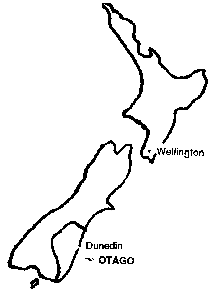
Some Background on the province of Otago, New Zealand

Evidence suggests that the first inhabitants of New Zealand were Moa-hunting
Polynesians but little is known of them other than folklore that has survived
in classic Maori traditions. The body of knowledge, however, is constantly
being expanded by archaeologists.
The most famous explorer of the South Pacific was Captain James Cook but
he did not make contact with the Maori in today's province of Otago on New
Zealand's South Island. Passing in 1770 he observed a 'green and woody '
land but no inhabitants. Sealers from Sidney, Australia and roving whalers
were the first to put ashore in the early 1800s.
By the 1830 a series of whaling stations had been set up along the coast
with some whalers growing wheat and potatoes for their own use and to send
back to Australia.
Otago Maori, on the whole welcomed the the rough and brutal visitors. For
one thing they liked the guns they brought so they could use them against
traditional enemies. But soon measles brought by the visitors was destroying
whole communities of Maori. The whalers rum took a toll on the survivors.
Sick tribes were soon selling off their land to European arrivals.
Johnny Jones was one of the first to take advantage of the situation. In
1838 he took over a whaling station and persuaded the Maori to accept him
as chief claiming 2 million acres of their land. He then brought in settlers,
including a missionary and doctor and started raising grain, cattle and
sheep to send to Australia.
In 1848 a closer market appeared with the arrival of 300 Scots and the settlement
of Dunedin was born. By the 1850s Dunedin's founders with stock from Jones
were pushing inland looking for more and more grazing land. And by 1860
most of the useful land to the east of South Island's mountain spine had
been taken. Otago was grazing nearly 300,000 sheep with quick fortunes being
made in this the start of an industry that today has over 9 million sheep
roaming Otago province.
A year later in 1861 even larger fortunes were about to
be made with the discovery of gold.